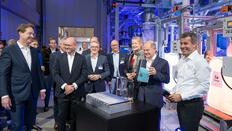
Overview
Mercedes-Benz has launched Europe's first battery recycling plant in Kuppenheim, Germany, utilizing an integrated mechanical-hydrometallurgical process. This facility aims to close the battery recycling loop, achieving a recovery rate of over 96% for valuable materials like lithium, nickel, and cobalt.
Investment and Capacity
The company has invested tens of millions of euros in this project, which underscores its commitment to sustainable practices and value creation in Germany. The plant has an annual capacity to process 2,500 tonnes of battery materials, contributing to the production of over 50,000 new battery modules for electric vehicles.
Technological Innovation
The recycling process involves shredding battery modules and separating materials such as plastics, copper, aluminum, and iron. The hydrometallurgical process then extracts valuable metals from the black mass, which are suitable for new battery production. This method is less energy-intensive compared to traditional pyrometallurgy, operating at lower temperatures and using 100% green electricity.
Collaborations and Research
Mercedes-Benz collaborates with Primobius, a joint venture between SMS group and Neometals, and receives funding from the German Federal Ministry for Economic Affairs and Climate Action. The project includes partnerships with three German universities to explore the entire recycling process chain, including logistics and reintegration concepts.
Future Implications
The knowledge gained from this initiative could help scale up battery recycling in the future, supporting the circular economy and reducing dependency on primary resources. The plant's operations align with Mercedes-Benz's broader sustainability strategy, which includes net carbon-neutral production and the use of reconditioned batteries for energy storage systems.

